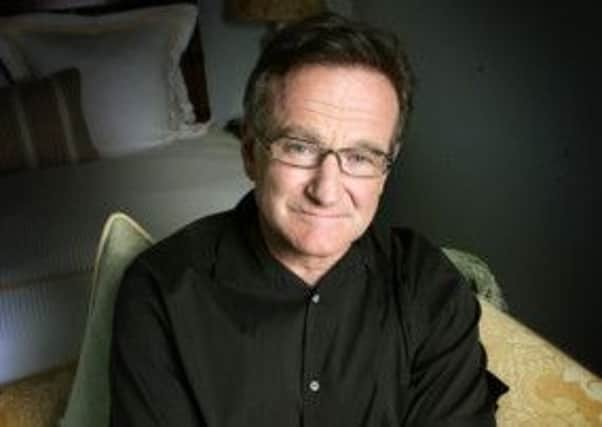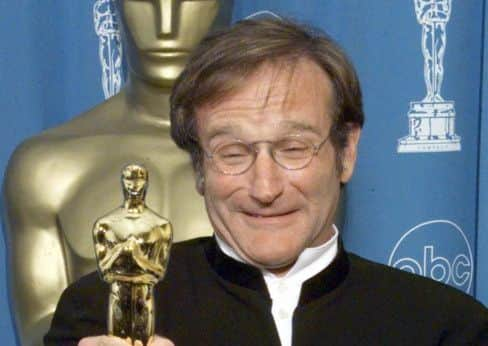Obituary: Robin Williams, comedian and actor


The phrase “comic genius” is much overused, but in Robin Williams’ case it was entirely apt, reflecting both the brilliance of his comedy and also the fragile psyche from which it came.
One of the funniest things I ever saw was a press conference in 1992 with Williams and his Hook co-star Dustin Hoffman. Hoffman gave long, carefully considered, very serious answers to questions, delivered very slowly.
Advertisement
Hide AdAdvertisement
Hide AdAnd Williams just riffed, darting here, there and everywhere, delivering flow of consciousness nonsense, in the voice of John Wayne, George Bush, John Major or a London street trader. By the time you got the joke, he was three or four gags farther down the line.


He did much the same when Disney hired him to voice the genie in the 1992 film Aladdin. Normally the animation comes first, but Disney let Williams improvise and then worked the visuals around the recordings. The character was witty, fast-talking, worked for adults as well as children and established the practice of big stars voicing animation.
That is the first thing to say about Williams – he was a comic genius, though the highs were clearly followed by lows and struggles with drink, drugs and depression.
The second thing is that Williams was not Scottish. It seems obvious. But it was widely reported early in his career that he was from Edinburgh. As recently as 1989, after his success in Mork and Mindy and Good Morning, Vietnam, the Guardian reported: “Robin Williams was born in Edinburgh in 1951, and his family moved to the US the following year.”
Apparently it stems from an occasion when Williams thought it would be a wheeze to do an interview entirely in a Scottish accent. The interviewer asked if it was an Edinburgh accent. Williams complimented the reporter on his shrewdness and confirmed that it was. The delighted reporter went off and committed to print that Williams was from Edinburgh. And an urban myth was born.
Williams had a long and affectionate relationship with Scotland and the Scots. His middle name was McLaurin, apparently. And of course he reprised the Scottish accent for the 1993 comedy hit Mrs Doubtfire.
He was great friends with Billy Connolly, stayed at his Candacraig estate in Aberdeenshire and seemed more than happy in the kilt. In 1999 he ran in the five-mile hill race at the Lonach Highland Games. The New York Daily News noted: “Despite his brawny thighs, Williams was one of the last to cross the finish line,” and that he was “puffing afterward”.
Williams was probably born in Chicago in 1951, though some sources say 1952. His father was an executive with a car company and Williams grew up largely in the Detroit area. He was apparently a shy child, though he showed an early aptitude for impersonation and drama.
Advertisement
Hide AdAdvertisement
Hide AdHe moved to California in his teens, attended Juilliard, the performing arts school in New York, and helped fund his studies by performing street mime and stand-up. It was as a comic, rather than an actor that he initially developed his career back in California. He attributed his manic style to the sort of places in which he appeared. “You had to, through sheer speed, force them not to throw things at you,” he said.
He also appeared at the Edinburgh Fringe in the early 1970s, at a time when there were a lot fewer stand-ups in the programme. In 1978 he was given a guest spot on the long-running sitcom Happy Days, playing the alien Mork. With his funny, high-pitched voice and surreal take on reality, the character proved so popular that he was given his own series Mork and Mindy.
In the downtime between seasons Williams starred in a big-budget, live-action film of Popeye, but it flopped at the box office, and it seemed Williams might be the latest in a long line of television stars that failed to make the leap to films. However, Good Morning, Vietnam, in which he played military DJ Adrian Cronauer, gave him his first big film hit in 1987. And when Dead Poets Society was released in 1989 only Jack Nicholson and Tom Cruise were ranked as bigger box-office draws in the annual poll of American cinema operators.
Williams remained one of the biggest box-office draws throughout the 1990s and had further hits with Jumanji, The Birdcage (the remake of the French farce La Cage aux Folles), Flubber and Good Will Hunting, for which he won an Oscar for best supporting actor. During his career he also won several Emmy and Grammy awards.
Hook and Mrs Doubtfire were among his biggest hits. The latter was an adaptation of a book by Anne Fine, an English writer who lived in Edinburgh and got the name Doubtfire from a New Town junk shop. Although the film relocated the story to the US, Williams used a Scottish accent, which was, he said, based on Bill Forsyth, with whom he had recently worked on Being Human.
Williams played a fun-loving, but irresponsible character who splits up with his wife and loses custody of the kids.
Impersonating an ageing Scottish matron, he applies for the job of nanny to get access. Williams spent four hours each day in make-up and wandered the streets in costume to test his characterisation.
In real life Williams’s first marriage had ended in divorce and he married his son’s nanny Marsha Garces, who was producer on Mrs Doubtfire. That marriage also ended in divorce.
Advertisement
Hide AdAdvertisement
Hide AdChildhood and adults who have never really grown up are recurring themes in Williams’s work and Williams faced increasing criticism for the sentimentality of his films and characters who seemed to be screaming out for the audience not only to find them funny, but to love them.
He made a brave attempt at redefining his screen image in 2002 when he played a creepy photographic technician who keeps pictures of his customers in One Hour Photo and a murderer in Insomnia, but they failed to repeat the success of earlier hits.
With his popularity apparently declining, Williams faced a string of personal upsets.
In 2006 he was admitted to a rehabilitation centre for alcohol problems, in 2008 his second wife filed for divorce and in 2009 he had to curtail a stand-up tour when he was admitted to hospital with heart problems.
It is a cliché that great comedians are often unhappy people, who develop comedy as a defence mechanism or an appeal for attention, but it did sometimes seem that way with Williams, who had problems with drugs, alcohol, health and personal relationships
In an interview a few years ago, he said: “You know, I was shameful, and you do stuff that causes disgust, and that’s hard to recover from.”
Williams’s publicist confirmed he had been suffering from depression and it was reported that his death was suicide. He is survived by his third wife Susan and by three children from his previous marriages.
BRIAN PENDREIGH